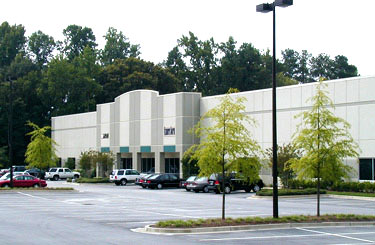
JANUARY 2005
Following the Facilities (cover)
Industrial Sites
Beckon Firms
From Auto
Suppliers to Tractors
Will Toyota
Be the Crown Jewel?
Report Offers
State Advice
Request Information

GEORGIA SPOTLIGHT
Report Offers State Advice

|
| The Newpoint Commons warehouse development by Triad Properties is located in Gwinnett County's northeast I-85 submarket, Atlanta's largest industrial submarket. The two-phase project has seen recent locations by Landini USA, Leica Geosystems and Lift-All. Gwinnett, which saw population growth of nearly 67 percent between 1990 and 2000 (to 588,448), projects its population will top 817,000 by 2009. |
The consultants' comments come on the heels of a report that outlines several steps for improving economic development efforts in Georgia. That report, prepared by the Competitiveness Task Force of the Commission for a New Georgia, calls for specific changes in the state's various incentives programs.
The report stated that of the 33 competitive projects that Georgia lost to South Carolina, the "key reason" was incentives.
To make Georgia more competitive, the task force recommends that "Georgia's incentives should be targeted toward jobs or capital in strategic industries with a positive effect on the state and local economy, and include 'clawbacks.' "Specifically, the task force called for the following changes:
- Decouple the state R&D credit from the federal program.
- Establish a grant or loan program as a closing fund for investment statewide using state bonds, with payback tied to performance measurement agreed to by the company.
- Expand the Quick Start (job training) program.
- Enhance income tax credits, property tax abatements and sales tax credits according to an individual client's needs. "These should be based on jobs, investment, geography, and research and development and should require a local contribution," the report noted.
Tax consultant Tammy Propst of Greenville, S.C., says that such changes are needed to make Georgia more competitive with its neighboring states.
"Currently, I would put South Carolina, Alabama and Mississippi at the top of the list of Southeastern states that offer the most aggressive tax incentives," says Propst. "Georgia has fallen a little behind due to several factors, including the inconsistent interpretation by the Department of Revenue in relation to certain programs and the lack of certain programs like an SAT [sales tax] exemption for building materials. Florida has made a huge leap forward and I would put them right up there with Georgia."
Still, all of the consultants interviewed by Site Selection say that Georgia remains one of the most attractive locations in the entire U.S. for manufacturing plants, distribution centers and corporate headquarters.
Corporate site selectors recently voted the Peach State as the No. 2 business climate in the country, behind Texas. And in March 2004, Inc. magazine rated Atlanta as the best market in the country for starting a business.
Craig Lesser, the new commissioner of the Georgia Department of Economic Development, tells Site Selection that business climate is far more important than incentives in landing a company.
"At the end of the day, it's about people feeling comfortable about doing business here," says Lesser, a former power company lobbyist and Atlanta talk radio host. "We want to establish a comfort level for companies so that they buy in because they want to buy in. Economic development is about long-term relationships. We must make sure that we look at it from the customer's perspective."
On the question of overhauling the state's various incentives programs, however, Lesser was less committal.
"We must take the same kind of look at incentives that we would as an investor," he said. "What is the return on investment? Where we may need to tweak our incentives, we will. But we must remember that these are difficult budget times. We must move forward on the basis of a value proposition."
Hans Gant, head of economic development for the Metro Atlanta Chamber of Commerce, says, "I don't think Georgia is any less competitive on incentives than any of the other Southeastern states. This issue only comes into play on very large projects. These mega-projects are highly sought after by all the states. Our own competitiveness will be looked at in the next year or two. And when we make changes, we will do so to match our desire to grow key industries."